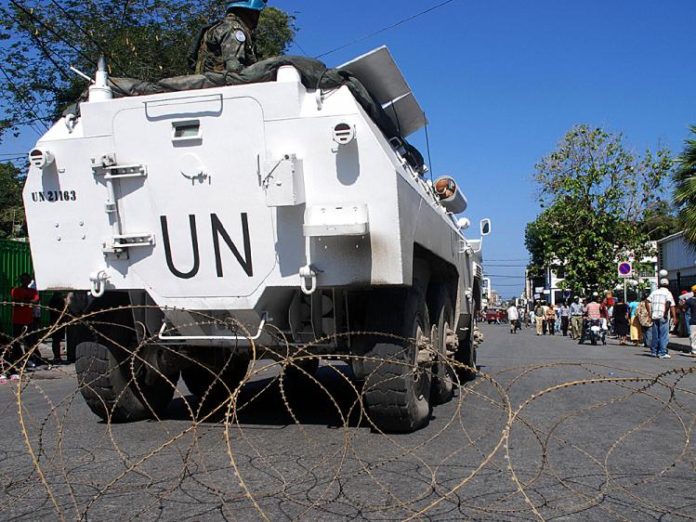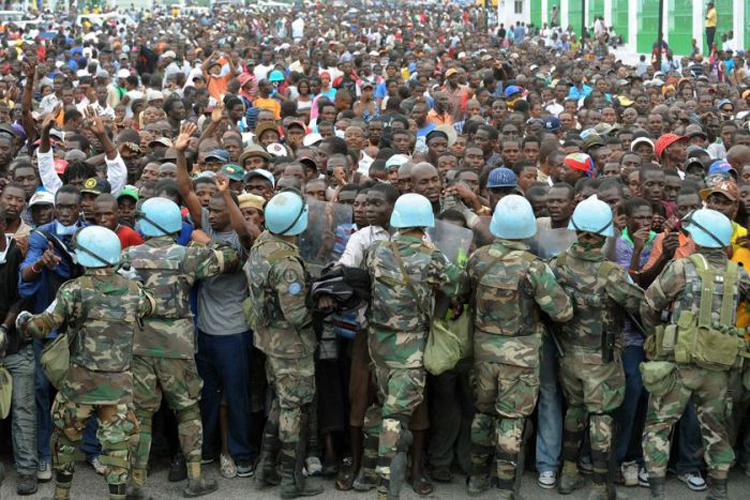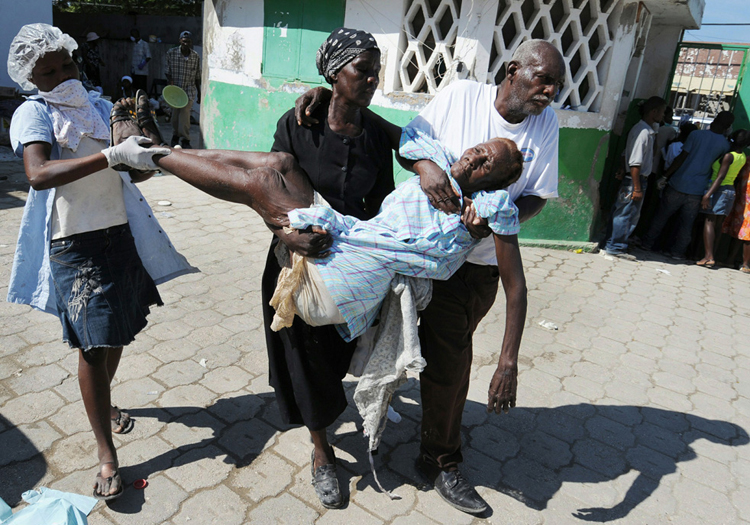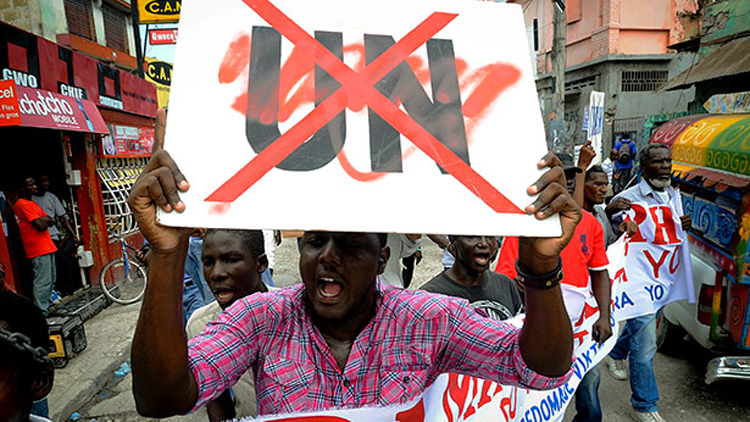
The worst crime of the United Nations Mission to Stabilize Haiti (MINUSTAH), which the UN Security Council extended on Apr. 13, 2017 and renamed after Oct. 15, 2017 United Nations Mission for Justice Support in Haiti (MINUJUSTH), has been to kill over 10,000 Haitians with cholera. These deaths resulted from two epidemics of cholera. After the first epidemic in 2010, the UN covered up the fact that several Nepalese soldiers on one or more of its bases near the city of Mirebalais had become violently ill with cholera, and then the bases dumped the troops’ raw sewage into the Artibonite River.
The second epidemic was introduced by an all-female group of so-called peacekeeping police from Bangladesh. Secretary General Ban Ki-moon has apologized for the first epidemic, but the UN has so far not acknowledged contaminating Haiti twice with cholera.
The UN mission was brought into Haiti in June 2004 to serve as an occupation army after a foreign-sanctioned coup d’état; in keeping with this role, rapes, sex traffic, exchange of sex for food, massacres, and murders have been its mainstays. There are countless reasons to rid Haiti of this degraded, degrading, and unwanted occupation force. The following are, to my mind, the top 10.
1) Common criminals in the UN mission enjoy immunity from prosecution.
Though over 100 troops have been expelled from Haiti for child prostitution, human trafficking, and related charges, these soldiers have enjoyed immunity for most of their crimes, including their numerous gang rapes of Haitians, and the suffocation in August 2010 of a Haitian teenager working on a Nepalese UN base.

2) The UN mission serves as an occupation force.
Together with Haitian paramilitaries, these troops ambushed and gunned down over 4,000 Fanmi Lavalas partisans soon after President Jean-Bertrand Aristide was deposed in 2004 in a coup plotted by the United States, Canada, France, and Haiti’s elite.
3) The UN mission has operated as a large gang that preys on the poor.
The troops have shot and beaten countless Haitians who were merely protesting for food, jobs and homes. They have conducted numerous raids on slums such as Cité Soleil to kill civilians. In some of these raids the soldiers have fired tens of thousands of rounds at dwellings and schools.
4) The UN mission subverts democracy.
On behalf of the US, Canada and France, the UN mission fixed the 2010-11 presidential and legislative elections to exclude 80 percent of the electorate and bring Michel Martelly to power. As part of these elections, the head of the mission, Edmond Mulet, threatened to depose then-President René Preval when he balked at withdrawing his party’s presidential candidate, Jude Célestin, from the second round. In 2015, elections financed and largely managed through the UN Development Programme (UNDP) were discovered to include a zombie vote of 77 percent.
5) UN troops have neglected Haitians during disasters and in fact showed spectacular cowardice in some cases.
During the first 36 hours after the earthquake of January 12, 2010, the troops hardly assisted Haitians and instead searched for each other. After Hurricane Matthew in October 2016, the troops did not lift injured Haitians to Port-au-Prince by air for treatment but mostly watched them.

6) The UN mission harbors vectors of disease.
The UN introduced a cholera epidemic from Nepal into Haiti in October 2010 and another epidemic from Bangladesh after 2012, which have killed over 10,000 Haitians. There has been no amend for these deaths. Instead, the UN has exploited the epidemic to promote the sale of oral cholera vaccines by friendly pharmaceutical companies.
7) By every measure, civic life in Haiti has deteriorated since the UN occupation.
The rates of violent crime and incarceration in Haiti are low, but they have steadily climbed since the introduction of the UN force. The UN occupation has assisted the destruction of Haiti’s agricultural economy and the promotion of greater than 85 percent unemployment, abject poverty, and even famine.
8) The presence of UN troops on Haitian soil is illegal.
Haiti’s UN mission is the only UN Chapter 7 force in a country that is not at war. Chapter 7 of the UN Charter gives the UN Security Council the power to “determine the existence of any threat to the peace” and take military and nonmilitary action to “restore international peace and security.” Participating countries have boasted about Haiti being a place where they could test their police methods and military equipment for urban warfare on an unsuspecting population.
9) The UN has trained a massive paramilitary force of Haitians.
Together with embedded personnel from the private military and security company DynCorp, the UN has already trained a so-called Haitian police force (Police Nationale d’Haiti, PNH) of more than 15,000 to replace its mission at the highest level of personnel it had achieved in Haiti.

10) The Haitian people despise the UN mission.
The perfidious UN occupation continues in Haiti because, through three presidential elections, the UNDP has conveniently arranged for winners who agreed to renew the mission’s mandate. For more than a decade, Haitians at home and abroad, young and old, have made clear that they want the mission out. Common epithets for the troops are vòlè kabrit! (goat thief), kakachwèt! (shitter), kolera! (cholera) and pedofil! (pedofile).
As of January 31, 2017, the mission’s troops in Haiti numbered 2,343; in order of their numbers, they were supplied by Brazil, Chile, Peru, Philippines, Bangladesh, Paraguay, Argentina, Guatemala, Honduras, El Salvador, Mexico, United States, Canada, Nepal, Jordan, Sri Lanka, Bhutan, and Ecuador.
As of February 23, 2017, the mission’s police in Haiti numbered 2,434; in order of their numbers, they were supplied by India, Jordan, Bangladesh, Senegal, Rwanda, Pakistan, Nepal, Canada, Niger, Colombia, Burkina Faso, Benin, Mali, Madagascar, El Salvador, Togo, Romania, Cameroon, United States, Indonesia, Argentina, Yemen, India, Philippines, Tunisia, Turkey, Ghana, Russia, Ethiopia, Egypt, Norway, Slovakia, Djibouti, Uruguay, Chile, Serbia, Sweden, Chad, Guinea, Brazil, Spain, Germany, Nigeria, Sri Lanka, Paraguay, Portugal, Jamaica, and France.
The Praetorian Guard that is the UN mission and the puppet Haitian president take their orders from a group of ancient and new colonists that call themselves the Friends of Haiti. They are: the United States, France, Canada, Brazil, Argentina, Chile, Colombia, Peru, Guatemala, and Uruguay.
Dady Chery is the author of “We Have Dared to Be Free: Haiti’s Struggle Against Occupation.” The original version of this article was printed on Dady Chery’s blog Haiti Chery.









